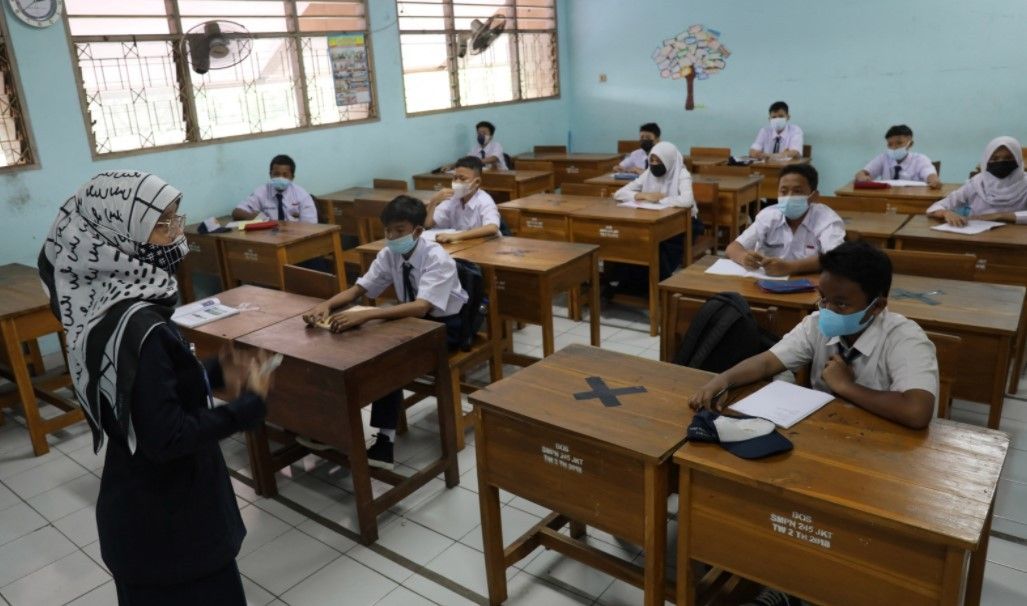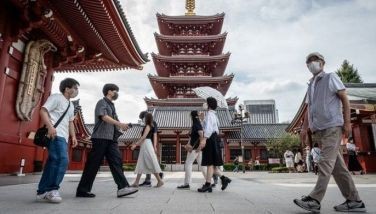Teachers should be priority group for COVID jabs — WHO

COPENHAGEN, Denmark — Teachers and school staff should be among the groups prioritised for COVID-19 vaccinations so that schools in Europe and Central Asia can stay open, the World Health Organization (WHO) and UNICEF said on Monday.
Measures to ensure that schools can stay open throughout the pandemic "include offering teachers and other school staff the COVID-19 vaccine as part of target population groups in national vaccination plans," the UN agencies wrote in a statement.
The recommendation, already made by a group of WHO experts in November 2020 before the vaccination roll-out, should be done "while ensuring vaccination of vulnerable populations," the statement said.
As schools reopen after the summer holidays, the agencies said it was "vital that classroom-based learning continue uninterrupted," despite the spread of the more contagious Delta variant of the virus.
"This is of paramount importance for children's education, mental health and social skills, for schools to help equip our children to be happy and productive members of society," the director of the WHO European region, Hans Kluge, said in the statement.
"The pandemic has caused the most catastrophic disruption to education in history," he added.
The agencies urged countries to vaccinate children over the age of 12 who have underlying medical conditions that put them at greater risk of severe COVID-19 disease.
It also recalled the importance of measures to improve the school environment during the pandemic, including better ventilation, smaller class sizes, social distancing and regular Covid testing for children and staff.
According to the WHO's recommendations published in early July, testing of children in risk groups who display COVID-19 symptoms should be a priority.
Pharma giants Sanofi and GSK said on July 29, 2020, that they have agreed to supply Britain with up to 60 million doses of a potential COVID-19 vaccine. The agreement covers a vaccine candidate developed by France's Sanofi in partnership with the UK's GSK and is subject to a "final contract."
This thread collects some of the major developments in the search for a vaccine to ease the new coronavirus pandemic. (Main photo by AFP/Joel Saget)
As negotiations towards a new pandemic treaty pick up pace, observers warn of watered-down efforts to ensure equitable access to the medical products needed to battle future Covid-like threats.
Shaken by the pandemic, the World Health Organization's 194 member states are negotiating an international accord aimed at ensuring countries are better equipped to deal with the next catastrophe, or even prevent it altogether.
The process is still in the early stages, with the aim of reaching an agreement by May 2024.
But critics warn that revisions being made to the preliminary negotiating text are weakening the language -- notably in a key area aimed at preventing the rampant inequity seen in access to vaccines and other medical products during the Covid pandemic.
"I think it is a real step backwards," Suerie Moon, co-director of the Global Health Centre at the Geneva Graduate Institute, told AFP. — AFP
Africa's first mRNA vaccine hub is ceremonially launched on Thursday to acclaim from the UN's global health chief, who hailed it as a historic shift to help poor countries gain access to life-saving jabs.
The facility was set up in the South African city of Cape Town in 2021 on the back of the success of revolutionary anti-Covid vaccines introduced by Pfizer/BioNTech and Moderna.
"This precious project... will bring a paradigm shift in addressing the serious problem we faced, the equity problem, during the pandemic, so (that) it's not repeated again," World Health Organization (WHO) head Tedros Adhanom Ghebreyesus tells a media briefing to mark the inauguration. — AFP
China has approved its first locally developed messenger RNA (mRNA) vaccine against Covid-19, its manufacturer said Wednesday, months after the relaxation of strict Covid-zero regulations sparked a surge in cases.
The vaccine, developed by CSPC Pharmaceutical Group Ltd, has been approved for "emergency use" by Beijing's health regulator, the company said in a statement.
It showed high efficacy in a trial in which it was used as a booster shot for people who have been given other types of vaccines, the company added, without offering further details. — AFP
COVID-19 vaccine maker Novavax raises doubts about its ability to continue its business, announcing plans to cut spending after struggles in rolling out its coronavirus jab.
Shares of Novavax plummeted 25 percent in extended trading, after the company reported fourth-quarter earnings that missed analyst estimates.
While the firm should have enough money to fund operations, the situation is "subject to significant uncertainty," it says in a statement. — AFP
The protection against Covid-19 from being previously infected lasts at least as long as that offered by vaccination, one of the largest studies conducted on the subject says.
Ten months after getting Covid, people still had an 88% lower risk of reinfection, hospitalisation and death, according to the study published in the Lancet journal.
That makes this natural immunity "at least as durable, if not more so" than two doses of Pfizer or Moderna's vaccines, the study says.
The authors nevertheless emphasized that their findings should not discourage vaccination, which remains the safest way to get immunity. — AFP
- Latest
- Trending
































